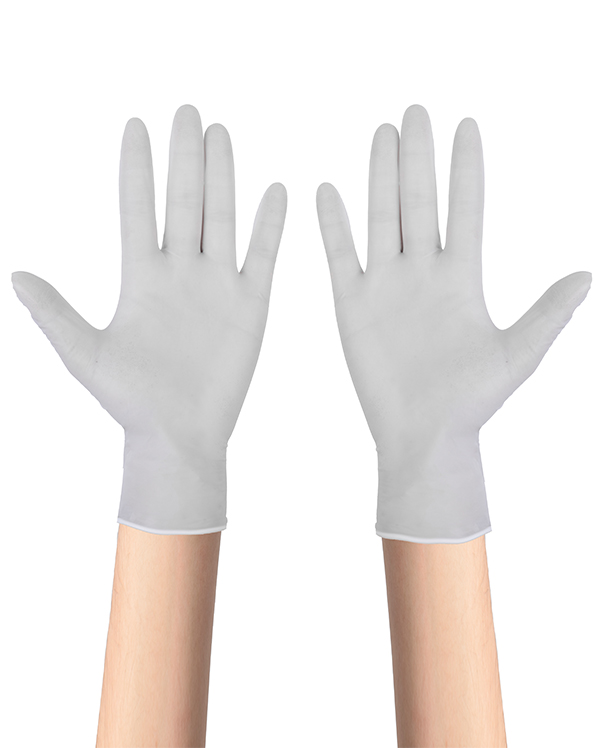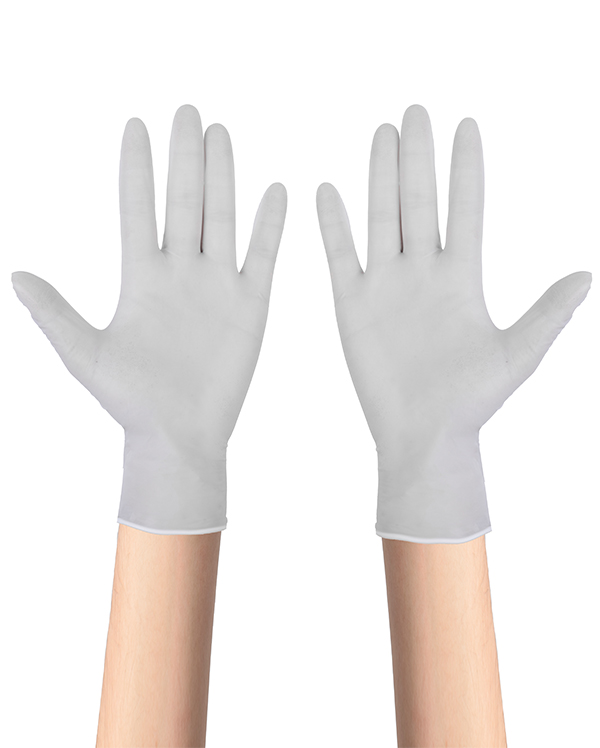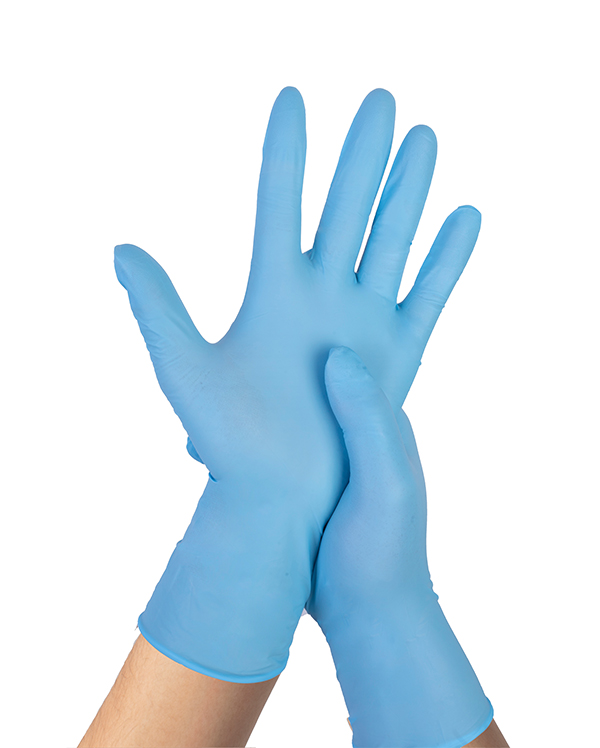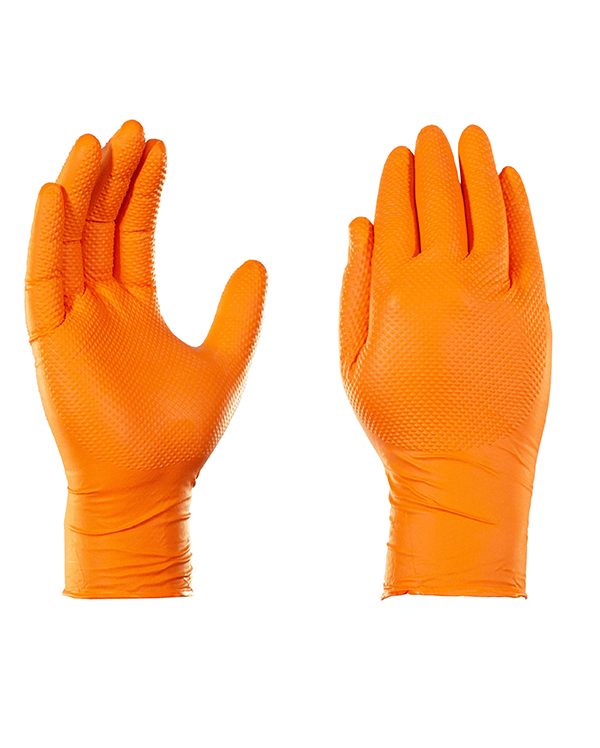Nitrile gloves are becoming increasingly popular in the food processing and handling industries, mainly due to their excellent oil, chemical and penetration resistance. Compared with latex gloves and vinyl gloves, nitrile gloves have good durability and protection, and can prevent oil, chemical and bacterial contamination during food processing. This article will analyze in detail the resistance of nitrile gloves to oil, chemicals and penetration in food contact to illustrate its importance and application advantages in the food industry.
1. Oil resistance: ensuring the cleanliness and safety of food processing
In the food processing and catering industries, employees often need to handle a large amount of oily foods, such as meat, cheese, vegetable oil, etc. Oil can easily penetrate some gloves with weaker materials, causing hand contamination and even affecting the cleanliness of food. Nitrile gloves are particularly suitable in these fields with their excellent oil resistance:
Oil is not easy to penetrate: Nitrile is a synthetic rubber material with a dense molecular structure that can effectively resist oil penetration. Compared with traditional latex gloves, nitrile gloves can maintain their protective properties for a longer time and will not quickly degrade or deform due to the action of grease.
Reduce cross-contamination: The oil resistance of nitrile gloves prevents grease from penetrating into the gloves, protecting the wearer's skin from food grease contamination, and also effectively preventing microorganisms or other contaminants on the hands from penetrating into the food. This reduces the risk of cross-contamination in catering and food processing, ensuring food hygiene and consumer safety.
Persistence and durability: The oil resistance of nitrile gloves significantly extends the service life of the gloves and will not accelerate degradation due to contact with grease. This makes the gloves suitable for long-term food processing processes, reduces the need for frequent gloves replacement, improves work efficiency and reduces costs.
2. Chemical resistance: Protect hands and improve work safety
During food processing, detergents, disinfectants and other chemicals are sometimes required to handle raw materials or clean equipment. For workers who operate these chemicals, the chemical resistance of gloves is very important. Nitrile gloves excel in this regard:
Chemical corrosion resistance: Nitrile gloves form a special molecular structure through polymerization during the production process, which makes them have good chemical corrosion resistance. It can resist corrosion from a variety of cleaning agents, disinfectants, and acidic and alkaline substances, and prevent the surface of the gloves from becoming thinner or cracked due to the action of chemicals.
Prevent skin allergies and chemical damage: Compared with latex gloves, nitrile gloves do not cause latex allergic reactions, and also have strong chemical protection. For food processing employees who need to frequently contact chemicals, nitrile gloves provide double protection, which not only prevents skin allergies, but also effectively prevents direct damage to the skin by chemicals.
Chemical barrier ability: Nitrile gloves have a strong chemical barrier effect, which can prevent chemicals from penetrating into the skin through the gloves. Therefore, when exposed to common chemicals such as detergents and bleaches, nitrile gloves can provide more comprehensive protection to ensure the safety of workers.
3. Anti-penetration performance: prevent microorganisms and contaminants from penetrating
Another key issue in the food industry is to prevent microorganisms, bacteria and other contaminants from penetrating gloves into food. The anti-penetration performance of nitrile gloves plays an important role in this regard:
Effectively block microorganisms: The high-density material structure of nitrile gloves can effectively block microorganisms such as bacteria and viruses and prevent them from penetrating gloves. This makes nitrile gloves an ideal choice for the food processing and pharmaceutical industries, especially in food production lines and quarantine inspections.
Liquid penetration resistance: Nitrile gloves can resist the penetration of liquids, preventing water, grease or other liquids from penetrating into the hands or food during operation. Whether it is the handling of dry food or working in a high humidity environment, the anti-penetration performance of nitrile gloves can ensure hand hygiene during operation.
Stable protection performance: Nitrile gloves can still maintain their anti-penetration performance after long-term use and will not fail due to long-term contact with liquids or grease. This feature makes its application in the food industry more reliable, and the protective effect can be ensured without frequent gloves replacement.
4. Application advantages in the food industry
In general, the grease, chemical and penetration resistance of nitrile gloves in the food industry provide all-round protection for all aspects of food processing. These performance advantages make nitrile gloves particularly suitable for the following scenarios:
Meat and seafood processing: When handling meat, fish and other foods with high oil content, nitrile gloves can effectively prevent oil penetration and keep the operating table and hands clean.
Baking and dairy processing: The oil resistance of nitrile gloves is particularly important in the baking industry and dairy processing to prevent oil from entering the hands and ensure food hygiene.
Chemical cleaning and disinfection: Chemical cleaners and disinfectants are frequently used in food processing and production environments. Nitrile gloves can resist the erosion of chemicals and protect the hand skin of workers.
High humidity or high moisture scenarios: In environments with high humidity or direct contact with water, the anti-permeability of nitrile gloves ensures dryness and hygiene of the hands, helping to prevent the spread of microorganisms.

 English
English  中文简体
中文简体















